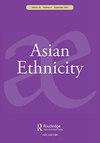Diverse fragility, fragile diversity: Sinophone writing in the Philippines and Indonesia
IF 0.8
Q3 ETHNIC STUDIES
引用次数: 1
Abstract
ABSTRACT Attending to postwar Chinese-language letters in Indonesia and the Philippines reveals a stronger tendency to write within a discourse of long-distance cultural nationalism than in hybrid or local modes. Omitting cultural nationalist discourses from a view of the corpus risks skewing accounts of Sinophone production, since many authors who write in Chinese have been receptive to ethnic, cultural, and even political appeals from China. This result is also ironic, in that it is specifically production in Chinese (rather than in imperial or archipelagic languages) which is most in tension with the postmodern and postcolonial bent of the Sinophone turn. As an open system for interrogating essentialist definitions of ‘Chineseness’, Sinophone Studies should also accommodate the culturally (and sometimes politically) orthodox ‘Chinese’ strands of Southeast Asian writing. Considering non- or less-hybrid strands of the corpus in turn opens new avenues for understanding the region’s Sinophone cultural production as the result of a rich, politically diverse network with considerable scope for comparative intraregional study.多样的脆弱,脆弱的多样性:菲律宾和印尼的华语写作
摘要关注战后印尼和菲律宾的汉语字母,可以发现,与混合或地方模式相比,在远距离文化民族主义的话语中写作的倾向更强。从语料库的角度来看,省略文化民族主义话语可能会扭曲对华文制作的描述,因为许多用中文写作的作者都能接受来自中国的种族、文化甚至政治诉求。这一结果也具有讽刺意味,因为它是专门用中文(而不是用帝国或群岛语言)制作的,与汉语转向的后现代和后殖民倾向最为紧张。作为一个质疑“中国性”本质主义定义的开放系统,汉语研究也应该适应东南亚写作中文化(有时是政治)正统的“中国”部分。考虑到语料库的非或不太混合的部分,反过来又为理解该地区的汉语文化生产开辟了新的途径,这是一个丰富、政治多样的网络的结果,具有相当大的区域内比较研究空间。
本文章由计算机程序翻译,如有差异,请以英文原文为准。
求助全文
约1分钟内获得全文
求助全文
来源期刊

Asian Ethnicity
PHYSIOLOGY-
CiteScore
2.80
自引率
6.20%
发文量
27
期刊介绍:
In the twenty-first century ethnic issues have assumed importance in many parts of the world. Until recently, questions of Asian ethnicity and identity have been treated in a balkanized fashion, with anthropologists, economists, historians, political scientists, sociologists and others publishing their studies in single-discipline journals. Asian Ethnicity provides a cross-disciplinary, international venue for the publication of well-researched articles about ethnic groups and ethnic relations in the half of the world where questions of ethnicity now loom largest. Asian Ethnicity covers any time period, although the greatest focus is expected to be on the twentieth and twenty-first centuries.
 求助内容:
求助内容: 应助结果提醒方式:
应助结果提醒方式:


